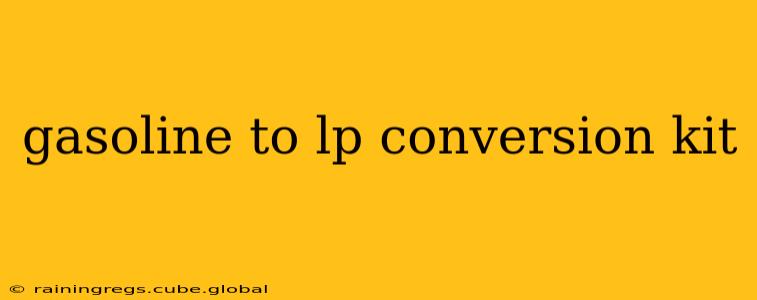Converting your vehicle from gasoline to liquid propane (LP) gas, also known as propane autogas, offers potential fuel savings and environmental benefits. However, it's a significant undertaking requiring careful planning and execution. This guide explores gasoline to LP conversion kits, addressing key aspects and frequently asked questions.
What is a Gasoline to LP Conversion Kit?
A gasoline to LP conversion kit is a collection of components designed to replace your vehicle's gasoline fuel system with one that utilizes liquid propane. These kits typically include a propane tank, fuel lines, a mixer or vaporizer (to convert liquid propane to a gaseous state for combustion), a fuel pressure regulator, and a control system to manage fuel delivery. The specific components and their complexity vary depending on the vehicle and the kit's manufacturer. Crucially, a professional installation is almost always recommended, as improper installation can lead to significant safety hazards.
What are the Advantages of Converting to LP Gas?
- Potential Cost Savings: Propane prices fluctuate, but they often offer a cost advantage over gasoline, particularly in certain regions. This can lead to substantial long-term savings, depending on driving habits and propane prices.
- Environmental Benefits: Propane burns cleaner than gasoline, producing fewer greenhouse gas emissions. This contributes to a smaller carbon footprint compared to gasoline-powered vehicles.
- Increased Engine Life: Propane's clean-burning properties can lead to less engine wear and tear, potentially extending the engine's lifespan.
What are the Disadvantages of Converting to LP Gas?
- Higher Initial Cost: The conversion kit itself, plus the professional installation, represents a significant upfront investment.
- Reduced Range: Propane tanks occupy space, typically reducing cargo space. Furthermore, the range of a propane-powered vehicle is usually less than its gasoline equivalent due to the lower energy density of propane. You'll need to factor in refueling stops more frequently.
- Limited Refueling Stations: While propane refueling infrastructure is growing, it's not as widespread as gasoline stations, particularly in some areas. This necessitates careful route planning, especially for long journeys.
- Vehicle Compatibility: Not all vehicles are suitable for conversion. Factors like engine type, fuel injection system, and overall vehicle design influence compatibility. Professional assessment is essential.
What are the Different Types of Gasoline to LP Conversion Kits?
Conversion kits vary significantly depending on the vehicle's make, model, and year. They range from basic systems suitable for older vehicles with carburetors to more sophisticated systems designed for modern fuel-injected vehicles. The complexity and cost increase with the sophistication of the system. Choosing the right kit is critical and should be done in consultation with a qualified installer.
How Much Does a Gasoline to LP Conversion Kit Cost?
The cost of a gasoline to LP conversion kit and installation can vary widely, depending on factors like the vehicle, the complexity of the conversion, the installer's labor rates, and the type of kit used. You can expect to pay several thousand dollars for the complete conversion, making it a substantial investment.
Is it Difficult to Install a Gasoline to LP Conversion Kit?
Absolutely not! Installing a gasoline to LP conversion kit is a complex procedure that requires specialized knowledge, tools, and expertise in automotive mechanics and propane systems. Attempting a DIY installation is strongly discouraged due to significant safety risks. Improper installation can lead to dangerous leaks, fire hazards, and even explosions. Professional installation is essential.
Where Can I Find a Qualified Installer for a Gasoline to LP Conversion Kit?
Contact local propane dealers or automotive repair shops specializing in alternative fuel conversions. Verify their experience and certifications before committing to an installation.
What is the Maintenance Involved with an LP Conversion?
Regular maintenance is crucial for safety and optimal performance. This includes regular inspections of the propane tank, fuel lines, and other components to detect any leaks or damage. Consult a qualified mechanic or propane specialist for routine maintenance and inspections.
This guide provides a comprehensive overview of gasoline to LP conversion kits. However, always consult with qualified professionals for specific advice tailored to your vehicle and situation. Remember, safety is paramount when working with propane systems.
